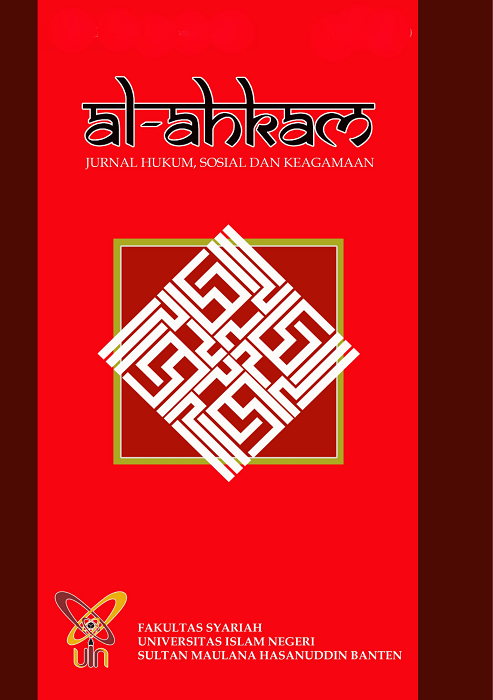The Implementation of Lineage Determination Methods in Illegal Marriages based on Wahbah Al-Zuhaily in the Determination of Banjarbaru Religious Court No. 80/Pdt.P/2017/PA.Bjb
DOI:
https://doi.org/10.37035/ajh.v18i2.6618Keywords:
Nasab, Nikah Fasid, Penetapan Pengadilan Agama.Abstract
This article discusses the method of determining lineage in fasid marriages according to Wahbah al-Zuhaily and its application in the Determination of the Banjarbaru PA No. 80/Pdt.P/2017/PA.Bjb regarding the judge's legal considerations in determining the case. Lineage is a family relationship that determines the origin of a child and causes civil law consequences, including inheritance rights, livelihood rights, and so on. Determination of lineage is very important because it is directly related to the family structure. Methods of determining lineage also vary, including through legal or fasid marriage, confession, and proof. In Islam, it is known that marriages that do not meet the legal requirements of marriage are known as fasid marriages. Fasid marriage is not legal. Has no legal status before the occurrence of intercourse. A child from a fasid lineage marriage is still dependent on his father if he meets the requirements in terms of the husband's ability to get pregnant or not, in terms of whether he has a husband or not, and from the minimum period of pregnancy whether he fulfills it or not. The istinbat method used by Wahbah al-Zuhaily is istislah, which is to protect the interests of the child so that his rights are protected. As for the application of Islamic marriage law in court stipulation no. 80/Pdt.P/2017/PA.Bjb the judge is in accordance with and refers to Wahbah al-Zuhaily's opinion as a legal consideration in determining the origin of the lineage of children in fasid marriages through certain conditions that have been exceeded by the applicants.
Downloads
References
al-Zuhaily, Wahbah. Al-Fiqh Al-Islamy Wa Adillatuh. terj. Abdul Hayyie Al-Kattani dkk. Depok: Gema Insani, 2008.
al-Zuhaily, Wahbah. al-Fiqh al-Islamy wa Adillatuh Jilid VII. Beirut: Dar al-Fikr, 1985.
Bisri, Cik Hasan. Peradilan Agama di Indonesia, cet. Pertama. Jakarta: RajaGrafindo Persada, 1996.
Fauzan, Andi Syamsu Alam dan. Hukum Pengangkatan Anak Perspektif Hukum Islam. Jakarta: Kencana Prenadamedia Group, 2008.
Hakim, M. Lutfi. “Menjaga Kehormatan Sebagai Perlindungan Nasab Perspektif Maqashid Syariah.” Jurnal Nizham 8, no. 1, (Januari-Juni 2020): 7.
Harlina, Yuli. "Status Nasab Anak dari Berbagai Latar Belakang Kelahiran (Ditinjau menurut Hukum Islam). Jurnal Hukum Islam 14, no. 1, (Juni 2014): 10
Kemenag RI, Tim Penterjemah al-Qur'an. Al-Qur'an dan Terjemahannya. Bandung: Diponegoro, 2014.
Nafis, Cholil. Fikih Keluarga. Jakarta Selatan: Mitra Abadi Press, 2014.
Khisni. Hukum Peradilan Agama. Semarang: Unisullla Press, 2011.
Manan, Abdul. Aneka Masalah Hukum Perdata Islam di Indonesia. Jakarta: Kencana Prenadamedia Group, 2017.
Irfan, M. Nurul. Nasab dan Status Anak dalam Hukum Islam. Jakarta: Amzah, 2015.
Al-Albani, Muhammad Nashiruddin. Tamam al-Minnah fi> Ta‘liq ‘ala> Fiqh as-Sunnah, terj. Syaikh Abu Abdurrahman Adil bin Yusuf Al-Azazy. Jakarta: Pustaka as-Sunnah, 2010.
Abu Habieb, Sa’adi. Ensiklopedia Ijmak, terj. Sahal Mahfudz dan Mustofa Bisri. Jakarta: Pustaka Firdaus, 2011.
Sakirman. "Telaah Hukum Islam Indonesia Terhadap Nasab Anak". Jurnal Hunafa: Studia Islamika 12, no. 2, (Desember 2015): 10-11.
Syarifuddin, Amir. Meretas Kebekuan Ijtihad Isu-Isu Penting Hukum Islam Kontemporer di Indonesia. Jakarta: Ciputat Press, 2005.
Muamar, Afif. "Ketentuan Nasab Anak Sah, Tidak Sah, dan Anak Hasil Teknologi Reproduksi Buatan Manusia: Antara UU Perkawinan dan Fikih Konvensional." Jurnal Al-Ahwal 6, No. 1, (2013): 2.
Prameswari, Yulis. "Analisis Yuridis Terhadap Penetapan Pengadilan Agama Banjarbaru Nomor 80/Pdt.P/2017/PA.Bjb Tentang Permohonan Asal Usul Anak Hasil Perkawinan Sirri". Skripsi. Surabaya: UIN Sunan Ampel, 2021.
Downloads
Published
Versions
- 2023-01-24 (2)
- 2022-12-31 (1)
How to Cite
Issue
Section
License
Copyright (c) 2022 Hasanudin Hasanudin, Fatimatuzzahro Fatimatuzzahro

This work is licensed under a Creative Commons Attribution-ShareAlike 4.0 International License.










